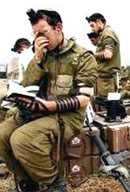Religion and the IDF

Profound changes have been occurring in the officer ranks of the Israel Defense Force, and not everybody is happy about them; some, in fact, are downright alarmed. The figures tell the story: back in 1990, kippah-wearing soldiers from the country's "national-religious" community—that is, religious Jews distinguished by their deep attachment to Zionism, Israeli nationalism, and, in many cases, the settlement enterprise—comprised a mere 2.5 percent of graduates from the army's course for infantry officers. In 2007, the figure peaked at more than 31 percent, a number totally out of proportion with the number of religious-national soldiers serving in IDF infantry units. Similar changes are said to be happening in elite units and among senior staff.
Are "the religious" taking over, as some have direly predicted? Participants at a recent conference at the Begin-Sadat Center for Strategic Studies were all agreed that the fears are unfounded: the Israeli army is not about to become the long arm of rabbinic law. Nor did they give credence to the specific charge that, in the event of a conflict between government policy and national-religious ideology, soldiers would disobey orders en masse. Before the 2005 disengagement from Gaza, such concerns were whipped into a frenzy, but in the event, only 40 soldiers declined to participate in the planned evacuation of Jewish settlements and during the evacuation itself only seven conscientiously objected.
At the conference, Major General Benny Ganz, the army's current deputy chief of staff, went so far as to term the increased participation of national-religious soldiers in the army "a non-story." But he also noted that the IDF considers the strengthening of Jewish identity among the ranks to be one of its primary goals, and it has enthusiastically welcomed religious soldiers who come already armed with a strong sense of identity and purpose. Such sentiments may explain why his fellow participant Asa Kasher, a professor of philosophy at Tel Aviv University and the author of the IDF code of ethics, recently wondered aloud whether the IDF intends to be a professional army or a professional army cum youth movement.
To what can one attribute the discipline and civic-mindedness exhibited by almost all religious soldiers during the Gaza disengagement? Factors regularly cited include the sophistication and sensitivity displayed by the IDF as a whole during the evacuation, the internalization of army norms by the soldiers, and the simple fact that many religious Zionists simply don't listen to the rabbis. A number of speakers at the conference pointed to another factor: the influence of preparatory programs designed to equip religious high-school graduates with the wherewithal to excel in army life.
Today there are thirteen such programs, the first of which was established by national-religious activists in 1988. Before then, the only available religious framework was the so-called Hesder yeshivas, which offer a shortened term of army service together with an extended period of religious studies. When Hesder soldiers serve, they often do so in largely segregated units. By contrast, the new programs enable young men and women to spend a year of study in physical and spiritual preparation for their upcoming term of service. Once enlisted, these religious soldiers typically strive to integrate fully into the IDF, and often choose to serve for the full three years. Significant numbers, having been actively encouraged to become officers by their teachers and rabbis (who are usually former soldiers themselves), commit themselves to an additional year.
Although the danger of split loyalties has been exaggerated, serious tensions do still remain, and the conference hardly overlooked them. As Stuart Cohen of Bar-Ilan University remarked, religious soldiers are often shocked by their first contact with the army's decidedly non-religious atmosphere, and in particular with the open mixing of the sexes. Unless religious soldiers choose to enlist in segregated Hesder units, they're left to navigate these pressures on their own. Yet he and other speakers emphasized that the challenges facing religious soldiers should be considered opportunities rather than problems.
After all, as Cohen observed, warfare hasn't been a subject of serious rabbinic inquiry since the time of Maimonides. Thanks in part to the presence, and the dilemmas, of religious soldiers in the IDF, an extensive literature has emerged in which today's generation of rabbis grapples with issues of war on a sustained basis—an unparalleled challenge that provides, ironically, another reason to be grateful to the secular, Zionist revolution in Jewish life.
FYI - The government statistically calls "Haredim" anyone who keeps Shabbbat, which includes National Religious. Israel's department of statistics published a report in 2006 of "who is religious". The report used only people over 20 years old and came up with a 33% as a national figure.
To see this study Go to: http://www.cbs.gov.il/hodaot2007n/19_07_104b.doc
If one puts in those under 20, so the figure goes off the richter scale to about 55 to 60%! In case one is not aware, population grows exponentially. This means if a religious family has an average of 7 children (which they do) then the growth in 27 years or so is 7 times 7. These kids grow up and each have 7 kids. you do the math... I really don't understand the government. First they complain religious don't go to the army. Then when they do (or it is proven that they really do) the same people are upset?
Am Yisrael Chai
Comments are closed for this article.





In general it is ironic that whereas when Haredim don’t go to the army they are castigated for letting others shed their blood to defend them. When “religious-national” above and beyond other groups choose combat units (although it should be mentioned that olim from the former Soviet Union are also vastly “overrepresented”) and disproportionately so many have fallen in the defense of Israel, instead of appreciation, the discussion centers around the extent this is a problem.